NEW DELHI — India plans to provide free medicines to the nation's poor, marking a major step forward in improving access to life-sustaining drugs. India’s public healthcare system is unable to cope with the needs of the country’s vast population.
Bharat Tiwari, 68, is despondent because doctors at a government-funded hospital in New Delhi have deferred surgery needed to treat his heart ailment. Such deferments are not unusual at the overstretched facility.
Tiwari says he has been told to return after two months. He has had medicines costing thousands of rupees in recent months, and worries about how to sustain the expenses.
His son, who has brought him from a distant village in Uttar Pradesh for treatment, says the $100 spent every month on his father’s medications adds up to a quarter of the family income. He was hoping a surgery would reduce the expenses on drugs.
Tiwari’s problems may lessen once the government implements a $5.4-billion plan to provide free generic drugs to all patients.
The initiative is seen as a huge leap forward in a country where drugs account for a major part of out-of-pocket healthcare expenses. Most Indians choose private medical treatment because government hospitals and clinics that provide free care are overcrowded and understaffed, and do not give free medicines.
Dr. K. Srinath Reddy, President of Public Health Foundation of India in New Delhi, says the cost of medicines in India, compared to per capita income, is very high. As a result many patients cannot afford them, particularly when they are needed for illnesses that require long-term treatment such as cancer or diabetes.
“It increases the out of pocket expenditure markedly and can even impoverish them to the extent of driving them below the poverty line. Even for cardiovascular diseases for example in Kerala, where we conducted a study with some of our collaborators, at least 14 percent of the patients had to give up life saving medicines because they could not afford them," Reddy said. "This could be a problem elsewhere too and we know that many of the patients who cannot afford medicines, do have interrupted treatment.”
The medications will be provided by India’s thriving generic-drug industry, which produces medicines for a fraction of the cost of branded drugs. Initially about 350 generic medicines will be dispensed - these include expensive drugs needed to treat AIDS, cancer and heart ailments. All these diseases are on the rise in India.
However, concerns have been expressed about implementing such a system in a country where many initiatives targeted at the poor have been mired in corruption.
George Mathew, chairman of New Delhi’s Institute of Social Sciences, says the intention is good. But he is not certain it will work effectively.
“This is a very important concern, how this will reach the target group. Unless a very, very good system is worked out, this will create a lot of problem," he said. "And this can end up in another scandalous scheme.”
“This is a very important concern, how this will reach the target group. Unless a very, very good system is worked out, this will create a lot of problem," he said. "And this can end up in another scandalous scheme.”
Optimists point to Indian states - Tamil Nadu and Rajasthan, which have already begun distributing free medicines. The Tamil Nadu government says about half the state’s population is taking advantage of the scheme. The numbers are on the rise in Rajasthan as well.
This has made healthcare experts like Dr. Reddy hopeful that the plan can be implemented successfully.
“In Rajasthan, in fact, which is the most recent entrant into the scheme, we have seen that patient attendance at primary health centers has started going up once the free medicines have been distributed - which means that the confidence of the people in the public system is being progressively restored now that they know that the public system is much more responsive,” he stated.
“In Rajasthan, in fact, which is the most recent entrant into the scheme, we have seen that patient attendance at primary health centers has started going up once the free medicines have been distributed - which means that the confidence of the people in the public system is being progressively restored now that they know that the public system is much more responsive,” he stated.
However, there are often long lines and lengthy waits for doctors to prescribe the medicines and collect the drugs. At public hospitals in Tamil Nadu and Rajasthan, corridors and stairwells often fill with people waiting their turn.
As a result, patients like 31-year-old Hemant Sharma are skeptical whether they will ever get the free drugs. He has been braving long lines at a New Delhi government hospital to be treated for a liver ailment.
He points out that the wait for doctors and treatment is long and tedious. He fears the wait for the medicines could be a similar struggle and a sick man may never manage to get hold of them.
Despite the skepticism, there is hope that the move could help millions of Indians who cannot afford to fund their healthcare and move the country toward universal health coverage. Officials say the plan will begin implementation nationwide from October, and about half the nation will have access to free drugs by 2017.
